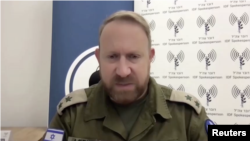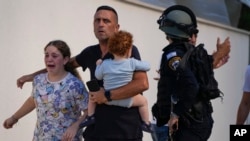One month after Hamas’ attacks on Israeli soil that resulted in the deaths of about 1,400 people and the abduction of more than 240 civilians, Israel says it will continue its military efforts to banish Hamas “from the realm of existence.”
In an interview with VOA conducted via Skype on Sunday, the spokesperson of the Israel Defense Forces, Lt. Col. Peter Lerner, said the country seeks above all to secure the release of all the hostages — who he said range in age from 10 months to 88 years.
“The hostage issue is at the top of our priority,” said Lerner, who said the number of hostages being held is now 241. “It is one of the missions of the war, of our efforts, and we are operating on the ground, air and at sea and utilizing all of the tools that we have.”
To date, Hamas has released five hostages but has not offered details about the condition or whereabouts of the other captives.
Israel’s aerial bombardment and ground invasion of Gaza has drawn outrage from Arab nations and human rights activists, with some saying the deaths of civilians and cutting off of water and electricity to Gazan citizens violates the laws of war. According to the Hamas-run Ministry of Health in Gaza, more than 10,000 Palestinians have been killed in Israeli attacks.
Lerner insists Israel is following proper guidelines.
“The IDF is operating based on principles of distinction, military necessity, proportionality, and weighing up the three of those components together in order to achieve our military goal,” Lerner said.
“One of our main efforts in the last three weeks has been to evacuate people from harm’s way,” Lerner said, adding that they have “been encouraging people through text messages, through phone calls, through voice messages, through leaflets we’ve dropped from the sky, phoning people and encouraging them to leave the combat zone.”
However, some Palestinians attempting to leave Gaza and Hamas officials have refuted this claim. They accuse Israel of blocking exit routes and leaving them stranded in a war zone.
Israel has justified its bombing by saying that Hamas fighters have embedded themselves among civilians in places like hospitals and refugee shelters.
Lerner said that while Israel does not intentionally target civilians, it is hard to avoid them and blamed Hamas for creating the situation.
“Our goal is to try and limit the civilian casualties as the operation proceeds. It is an unfortunate reality of warfare,” he said.
He emphasized that Israel was forced to take action following the surprise attack by Hamas.
“We need to remember we did not ask for this war,” he said, pointing out that some Israelis believe the government failed the people of Israel “because we were working under the assumption that Hamas doesn’t want to have a war with us.”
Asked whether there were Israeli intelligence failures leading up to the October 7 attacks, Lerner said that was partly correct.
“Indeed, the intelligence failure was on a strategic level, to begin with. And that influenced all of the processes beneath that strategic level.
“If we have the working assumption that Hamas isn’t going to or isn’t attempting to go to war with Israel, that determines all of the, I would say, assets, efforts, components, the gathering that in the end influenced the amount of forces that you have on the ground on that Saturday, that terrible Saturday, four weeks ago,” he said.
Lerner pledged to ensure that the surprise attacks of October 7 would not be repeated. He pointed to a destruction of Hamas infrastructure, including command-and-control positions, rocket launchers and explosive drone capabilities.
“It’s a process that will end in the defeat of Hamas as a governing authority,” he said. “We’re determined to do it. And as I said, we really don’t have any other choice. There is no way that Israel can go back to the situation of October 6, the day before.”
As for fear of igniting a fight with Lebanon and Hezbollah, Lerner said Israel is not planning to expand its fight to Lebanon.
“We are very focused on what’s happening on the border with Gaza,” he said. “We want to remain and achieve our mission there. That is why we’re not looking to expand the confrontation with Hezbollah in the north.”
But during a speech on November 3, Hezbollah leader Hassan Nasrallah said the group has been involved since Hamas attacked Israel. “I am telling you, we have been engaged in this battle since October 8,” Nasrallah said. “The Islamic resistance in Lebanon started operation the very next day.”
Lerner said Israel’s response should serve as a warning to militants attempting to enter the conflict on Hamas’ behalf.
“I would say Hezbollah needs to decide, are they working for Iran or the people of Lebanon?
“I would say to the government of Lebanon, you need to take charge of what’s happening in the south and prevent Hezbollah from escalating the situation, because Lebanon has a lot to lose if this deteriorates.
“And to Hezbollah, I say look very carefully how we are dismantling and destroying Hamas in Gaza and think very carefully if you want to cross that threshold,” he said.
This story originated in VOA’s English to Africa Service.





